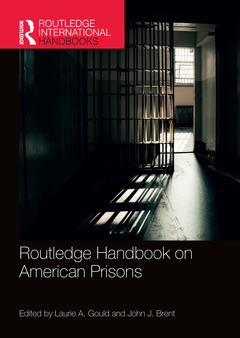Description
Routledge Handbook on American Prisons
Routledge International Handbooks Series
Coordinators: Gould Laurie A., Brent John J.
Language: English
Subject for Routledge Handbook on American Prisons:
Keywords
Young Men; Correctional Facilities; prison; Sentencing Guidelines; prisoners; Correctional Staff; penology; Death Penalty Information Center; corrections; RNR Model; overcrowding; Correctional Officers; collateral consequences; Texas Department Of Criminal Justice; mass incarceration; Geo Group; death row; Violate; U.S; prison system; Female Inmates; Prison health care; Major Depression; Criminal justice reform; Private Prisons; Prison administration; General Prison Population; Bipartisan agreement; Cervical Cancer; Mental Illness; Supermax Confinement; Vice Versa; Death Row Inmates; Inmate Misconduct; Incarcerated Women; Elderly Prison Population; Elderly Inmates; Work Release
Publication date: 12-2021
· 17.8x25.4 cm · Paperback
Publication date: 11-2020
· 17.8x25.4 cm · Hardback
Description
/li>Contents
/li>Readership
/li>Biography
/li>
The Routledge Handbook on American Prisons is an authoritative volume that provides an overview of the state of U.S. prisons and synthesizes the research on the many facets of the prison system. The United States is exceptional in its use of incarceration as punishment. It not only has the largest prison population in the world, but also the highest per-capita incarceration rate. Research and debate about mass incarceration continues to grow, with mounting bipartisan agreement on the need for criminal justice reform.
Divided into four sections (Prisons: Security, Operations and Administration; Types of Offenders and Populations; Living and Dying in Prison; and Release, Reentry, and Reform), the volume explores the key issues fundamental to understanding the U.S. prison system, including the characteristics of facilities; inmate risk assessment and classification, prison administration and employment, for-profit prisons, special populations, overcrowding, prison health care, prison violence, the special circumstances of death row prisoners, collateral consequences of incarceration, prison programming, and parole. The final section examines reform efforts and ideas, and offers suggestions for future research and attention.
With contributions from leading correctional scholars, this book is a valuable resource for scholars with an interest in U.S. prisons and the issues surrounding them. It is structured to serve scholars and graduate students studying corrections, penology, institutional corrections, and other related topics.
Preface; Part 1: Prison Security, Operations, and Administration; 1. Prison Rules, Regulations, and Disciplinary Procedures; 2. The Evolution of Privatized Corrections in America; 3. Review of Risk Assessment and Classification in Prison; 4. Working in Institutional Corrections: The Roles, Responsibilities, and Challenges of Being a Correctional Officer; 5. Convenience without Conscience: Supermax Confinement in American Penology; Part 2: Types of Offenders and Populations; 6. Who Goes to Prison and Why: Examining Offender Characteristics and Offense Types; 7. Women in Corrections; 8. People Suffering from Mental Illness in Prison; 9. Elderly Inmates; Part 3: Living and Dying in Prison; 10. Prison Violence; 11. Misconduct in Corrections; 12. Sexual Behavior in Prison; 13. Correctional Healthcare; 14. Life on Death Row; Part 4: Release, Reentry, and Reform; 15. Cognitive and Psychological Programming for Correctional Populations; 16. Educational and Skill-Based Programming; 17. Collateral Consequences of Incarceration; 18. Collateral Consequences of Incarceration on Community; 19. Reforming Penality
Laurie A. Gould is an Associate Professor of Criminal Justice and Criminology at Georgia Southern University in Statesboro, Georgia. Previously, she was an Assistant Professor of Criminology and Criminal Justice at the University of Texas at Arlington. She earned her PhD in Public Affairs from the University of Central Florida. Her areas of specialization include, corrections, comparative penology, state fragility, and gender and crime. She has co-authored two books [em dash] Corporal Punishment Around the World (Praeger) and State Fragility Around the World: Fractured Justice and Fierce Reprisal (CRC Press) [em dash] and her journal articles have been published in numerous national and international journals including The British Journal of Criminology, Violence Against Women, and Women and Criminal Justice. Her teaching interests include comparative world justice systems, corrections, and research methods.
John J. Brent, is an Assistant Professor in the School of Justice Studies at Eastern Kentucky University. His areas of interest include the cultural and structural dynamics of crime and crime-control, how institutions create and perpetuate inequalities, building a theoretical foundation for criminal justice theory, and how individuals are disciplined and punished.

